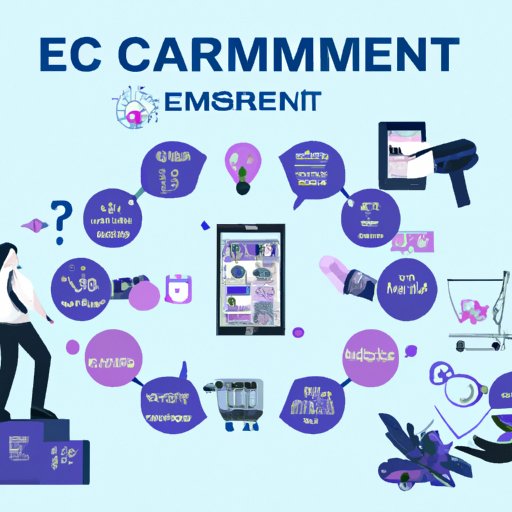Introduction
Managing an ecommerce business is a complex process that requires a great deal of knowledge and expertise. Whether you’re just starting out or looking to improve existing operations, understanding the key components of successful ecommerce business management is essential for achieving success.
This article will provide an overview of the topics that need to be addressed when managing an ecommerce business. We’ll cover everything from creating a comprehensive business plan to utilizing strategic marketing tactics, as well as offering quality customer service and monitoring and analyzing performance.

Create a Comprehensive Business Plan
Creating a comprehensive business plan is the first step in managing an ecommerce business. This plan should include goals and objectives, an analysis of your target market, an assessment of your competitors, and a detailed plan for financial resources.
When defining goals and objectives, it’s important to be realistic and set achievable targets. Consider what you want to achieve with your ecommerce business and develop measurable goals that will help you get there. Identifying your target market is also essential – understand who your customers are and what they need from you.
Analyzing your competitors is another critical component of the business planning process. Research your competitors’ pricing strategies, product offerings, and other marketing tactics to gain a better understanding of the competitive landscape. Finally, developing a plan for financial resources is key – decide how much money you need to invest in order to get your business off the ground.
Utilize Automation and Technology
In today’s digital age, it’s essential to make use of automation and technology when managing an ecommerce business. Investing in suitable software can help streamline operations and reduce costs. Cloud computing is also beneficial, as it allows you to access data and applications from any device with an internet connection.
In addition, automation tools are available to help automate mundane tasks such as order processing and customer communication. Utilizing these tools can free up time and resources, allowing you to focus on more pressing matters.
Develop an Effective Online Presence
Having an effective online presence is essential for any ecommerce business. Designing a professional website is the first step – make sure the design reflects your brand identity and is easy to navigate. Optimizing for search engines is also important – use keywords and meta descriptions to help boost visibility in search engine results pages.
Leveraging social media platforms is another way to build an effective online presence. Create accounts on popular networks such as Facebook, Twitter, and Instagram and use them to promote your products and services. Additionally, consider using paid advertising on social media to reach a wider audience.
Utilize Strategic Marketing Tactics
Developing and implementing a strategic marketing plan is essential for success. Content marketing is a powerful tool – create informative blog posts, videos, and other content to engage potential customers and establish yourself as an authority in your industry.
Establishing partnerships with complementary businesses can also help to increase sales. For example, you could offer discounts to customers who purchase from both your business and a partner’s business. Email marketing is another effective tactic – send out newsletters and promotional emails to keep customers informed about new products and special offers.
Manage Inventory and Shipping
Effective inventory and shipping management is crucial for keeping customers happy. Track stock levels in real time to ensure items are always in stock and assess fulfillment services to ensure orders are shipped promptly. Research different shipping options and choose the most cost-effective option for your business.
Offer Quality Customer Service
Providing quality customer service is essential for any ecommerce business. Develop a customer service policy outlining your expectations and make use of live chat functionality to respond to customer queries quickly and efficiently. Additionally, consider offering after-sales support such as warranty programs and repair services.

Monitor and Analyze Business Performance
Monitoring and analyzing business performance is vital for long-term success. Set up analytics tools to track website traffic and conversions and track key performance indicators such as sales, profit margin, and customer retention rate. Regularly evaluate current strategies and adjust as necessary to ensure optimal performance.
Conclusion
Managing an ecommerce business is a complex process that requires a great deal of knowledge and expertise. Creating a comprehensive business plan, utilizing automation and technology, developing an effective online presence, utilizing strategic marketing tactics, managing inventory and shipping, offering quality customer service, and monitoring and analyzing business performance are all essential for achieving success.
By following the tips outlined in this article, you’ll have the necessary tools and knowledge to effectively manage your ecommerce business and maximize profits.
(Note: Is this article not meeting your expectations? Do you have knowledge or insights to share? Unlock new opportunities and expand your reach by joining our authors team. Click Registration to join us and share your expertise with our readers.)
